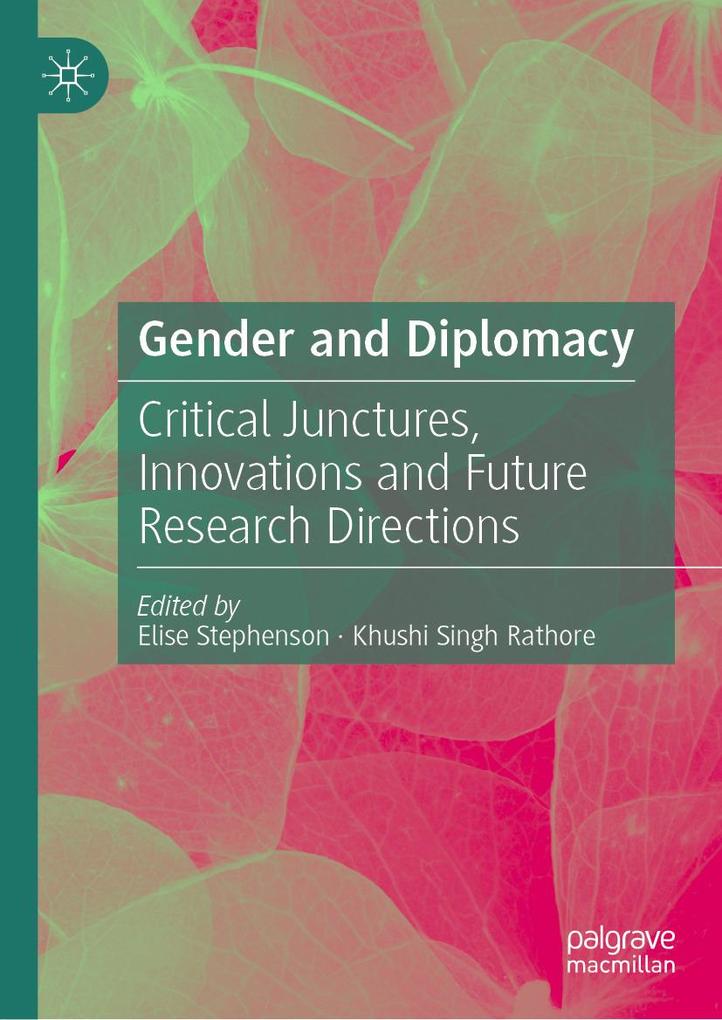
Sofort lieferbar (Download)
This edited collection aims to bring new contexts and research innovations to study the changing nature of gender in diplomacy. Whilst historically most diplomats were men, in the twenty-first century, the proportion of women (and others of diverse backgrounds) has increased markedly and in select cases, surpasses men. Digital diplomacy, glass cliffs, diplomatic gatekeeping, nation branding, queer and critical race studies and more have begun to be studied in the context of gender and diplomacy, raising new questions, in new contexts, and driving new innovations in diplomacy. How is diplomacy responding to these changes? How does gender, sexuality and race intersect to reproduce diplomatic relations?
This edited collection unpacks the queering of diplomacy, the security/diplomacy nexus, gender and West/non-West distinctions in diplomacy, gender and foreign policy, and women in MFAs and foreign service.
Elise Stephenson is a multi-award-winning researcher, strategist and entrepreneur, and Deputy Director at the Global Institute for Women's Leadership, Australian National University (ANU). She is an inaugural member of the Gender and Diplomacy Network at the University of Gothenburg, the Gender, Space and National Security Fellow at the ANU's National Security College, and an Adjunct at Griffith Asia Institute. Her book, The Face of the Nation: Gendered Institutions in International Affairs is awarded the 2024 Bertha Lutz Prize for the best public writing on women in diplomacy, and the 2024 Crisp Prize Commendation from the Australian Political Sciences Association.
Khushi Singh Rathore holds a PhD in International Politics from the Centre for International Politics, Organization and Disarmament (CIPOD) at Jawaharlal Nehru University, India. She is an inaugural member of the Gender and Diplomacy Network at the University of Gothenburg and is Associate Editor for The Hague Journal of Diplomacy. Her doctoral thesis entitled 'Women in Early Years of India's Foreign Policy: Evaluating the Role of Vijaya Lakshmi Pandit' is a pioneering study on women in Indian diplomacy. Her research interests are Gender and Diplomacy, Feminist IR, Diplomatic History, Indian foreign policy and Asian foreign relations.
Inhaltsverzeichnis
Foreword: Trends Over Time. - 1 Introduction: Critical Junctures, Pockets of Progress, and Building Backlash for Gender in Diplomacy. - Part I: Contentious and (In)Visible: New Domains in Gender+ and Diplomacy. - 2 Missing Post Reports: Locating the Queer Diplomat Biography. - 3 The Gendered Figurations of Women Diplomats and the Volumetric Presence of China in Nepal. - 4 Women in 20th Century German Diplomacy: A History of Firsts. - Part II: Not just Adding and Stirring: Women Implementing of Foreign Policy. - 5 Women Diplomats During the Interwar Period: Alexandra Kollontai and Palma Guillén in Latin America. - 6 Women in Small States Diplomacy: Gender-Related Challenges in Lithuania s Foreign Service. - 7 Bridging the Gender Gap in Global Diplomacy: Policy Implementation in the Scandinavian Foreign Services. - Part III: Networks, Reflections, Transformations: Engaging the Frontiers of Gender in Foreign Policy. - 8 The (Re)Emergence of Women s Organisations of Diplomats (WODs) in the 21st Century: Sites of Creative Agency for the (Re)Staging of Differentiated Subjectivities in Diplomacy? . - 9 Women Ambassadors in the UN Security Council: Are They Shaping the Practice of Diplomacy? . - 10 Feminist Oral Life History in Gender and Diplomacy Research. - Conclusion: Future Directions, Innovations, Theory and Research on Gender and Diplomacy.
Produktdetails
Erscheinungsdatum
09. Mai 2025
Sprache
englisch
Seitenanzahl
288
Dateigröße
5,15 MB
Reihe
Progress in Mathematics
Herausgegeben von
Elise Stephenson, Khushi Singh Rathore
Verlag/Hersteller
Kopierschutz
mit Wasserzeichen versehen
Produktart
EBOOK
Dateiformat
PDF
ISBN
9783031830648
Entdecken Sie mehr
Bewertungen
0 Bewertungen
Es wurden noch keine Bewertungen abgegeben. Schreiben Sie die erste Bewertung zu "Gender and Diplomacy" und helfen Sie damit anderen bei der Kaufentscheidung.









